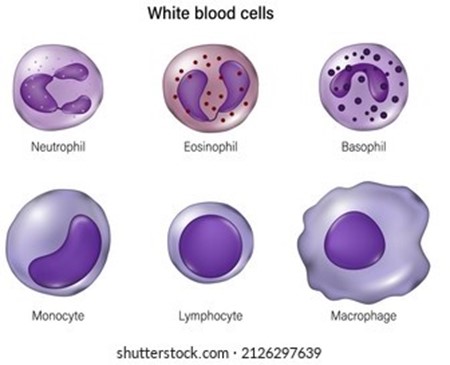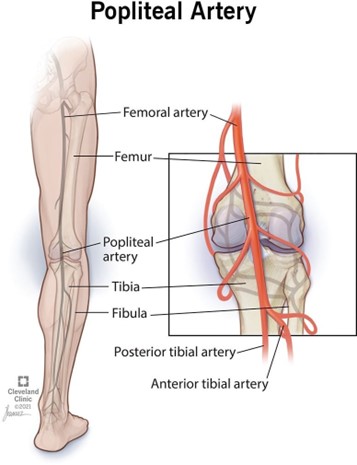While looking at a sample of blood in a microscope, you see a cell that is markedly larger than a red blood cell.
It has a bi-lobed nucleus and is filled with red granules in the cytoplasm.
What type of blood cell is this?
Basophil.
Lymphocyte.
Eosinophil.
Monocyte.
Neutrophil.
The Correct Answer is C
This type of blood cell is a granulocyte that has a bi-lobed nucleus and red granules in the cytoplasm.

Eosinophils are involved in allergic reactions and parasitic infections.
Choice A is wrong because basophils are granulocytes that have a lobed nucleus and dark blue or purple granules in the cytoplasm.
Basophils are involved in inflammatory responses and histamine release.
Choice B is wrong because lymphocytes are agranulocytes that have a large round nucleus and a thin rim of cytoplasm.
Lymphocytes are involved in immune responses and produce antibodies.
Choice D is wrong because monocytes are agranulocytes that have a kidney-shaped nucleus and a pale blue cytoplasm.
Monocytes are involved in phagocytosis and tissue repair.
Choice E is wrong because neutrophils are granulocytes that have a multi-lobed nucleus and pale pink granules in the cytoplasm.
Neutrophils are involved in bacterial infections and inflammation.
Nursing Test Bank
Naxlex Comprehensive Predictor Exams
Related Questions
Correct Answer is C
Explanation
The popliteal artery is a continuation of the femoral artery that runs through the back of the leg and the knee.

It is located in the popliteal fossa, a hollow space behind the knee. The popliteal pulse can be felt behind the knee.
Choice A is wrong because the thymus is a gland in the chest, not in the leg.
Choice B is wrong because the liver, spleen, and upper gastrointestinal tract are organs in the abdomen, not in the leg.
Choice D is wrong because the colon and rectum are parts of the large intestine, not the leg.
Correct Answer is C
Explanation
Pathogens are disease-causing agents. They can be bacteria, viruses, fungi, protists, or parasitic worms.
They can infect other organisms and cause various diseases.
Choice A is wrong because phagocytic leukocytes are a type of white blood cell that can engulf and destroy pathogens.
They are part of the immune system and help fight infections.
Choice B is wrong because antibodies are proteins that can bind to specific antigens on the surface of pathogens and mark them for destruction by other immune cells.
They are also part of the immune system and help fight infections.
Choice D is wrong because agents that alter DNA base sequences are not necessarily pathogens.
They can be mutagens, such as chemicals or radiation, that can cause changes in the DNA of cells.
Some mutagens can also be carcinogens, which can cause cancer.
Whether you are a student looking to ace your exams or a practicing nurse seeking to enhance your expertise , our nursing education contents will empower you with the confidence and competence to make a difference in the lives of patients and become a respected leader in the healthcare field.
Visit Naxlex, invest in your future and unlock endless possibilities with our unparalleled nursing education contents today
Report Wrong Answer on the Current Question
Do you disagree with the answer? If yes, what is your expected answer? Explain.
Kindly be descriptive with the issue you are facing.
